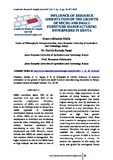Influence of resource orientation on the growth of micro and small furniture manufacturing enterprises in Kenya

View/
Date
2018Author
Okello, GA
Ngugi, PK
Otieno, Romanus Odhiambo
Metadata
Show full item recordAbstract
MSEs contribute about 70% to the country’s GDP and over 80% of the countries employment. Therefore, promotion of MSEs and, especially of those in the informal sector is viewed as a viable approach to sustainable development because it suits the resources in Africa. MSEs are the main source of employment in developed and developing countries alike, comprising over 90% of African business operations and contributing to over 70% of African employment and GDP. However, reports indicate that MSEs are ranked highest to risk exposure related to management. The higher exposure to risk for the MSEs leads to high collapse rate that leads to loss ofjob and hence low economic development to the country. High dependence on old methods of doing business, lack of entrepreneurial management was ranked highest among the risks by businesses in Kenya. Entrepreneurial management has been fronted as a key determinant for a firm’s growth and profitability. It has been related to high firm growth. Entrepreneurial management helps firms to be proactive in managing uncertainty to create long-term value because uncertainty has upside potential as well as a downside exposure. Therefore, this study sought to establish the influence of resource orientation on growth of MSE in furniture manufacturing industry in Kenya. To achieve the objective of this study, the study was guided by contingency theory and resource-based view theory. The research approach adopted in this study was the mixed method. The target population of study was the 10,345 owners/managers of Furniture manufacturing MSEs in Nairobi. A sample of 393 owner/managers of furniture business in Nairobi were selected using stratified random sampling. The study used a questionnaire for data collection purposes. Respondents filled in the questionnaire as the researcher waits, a drop and pick later method was employed in cases where it was not possible to fill in the questionnaire same day. The researcher did pilot testing the of research instrument to ensure its reliability and validity. The study generated both qualitative and quantitative data. Correlation inferential analysis was employed for analysis. The study also used correlation to show the degree of association between the independent variables and the dependent variable.
